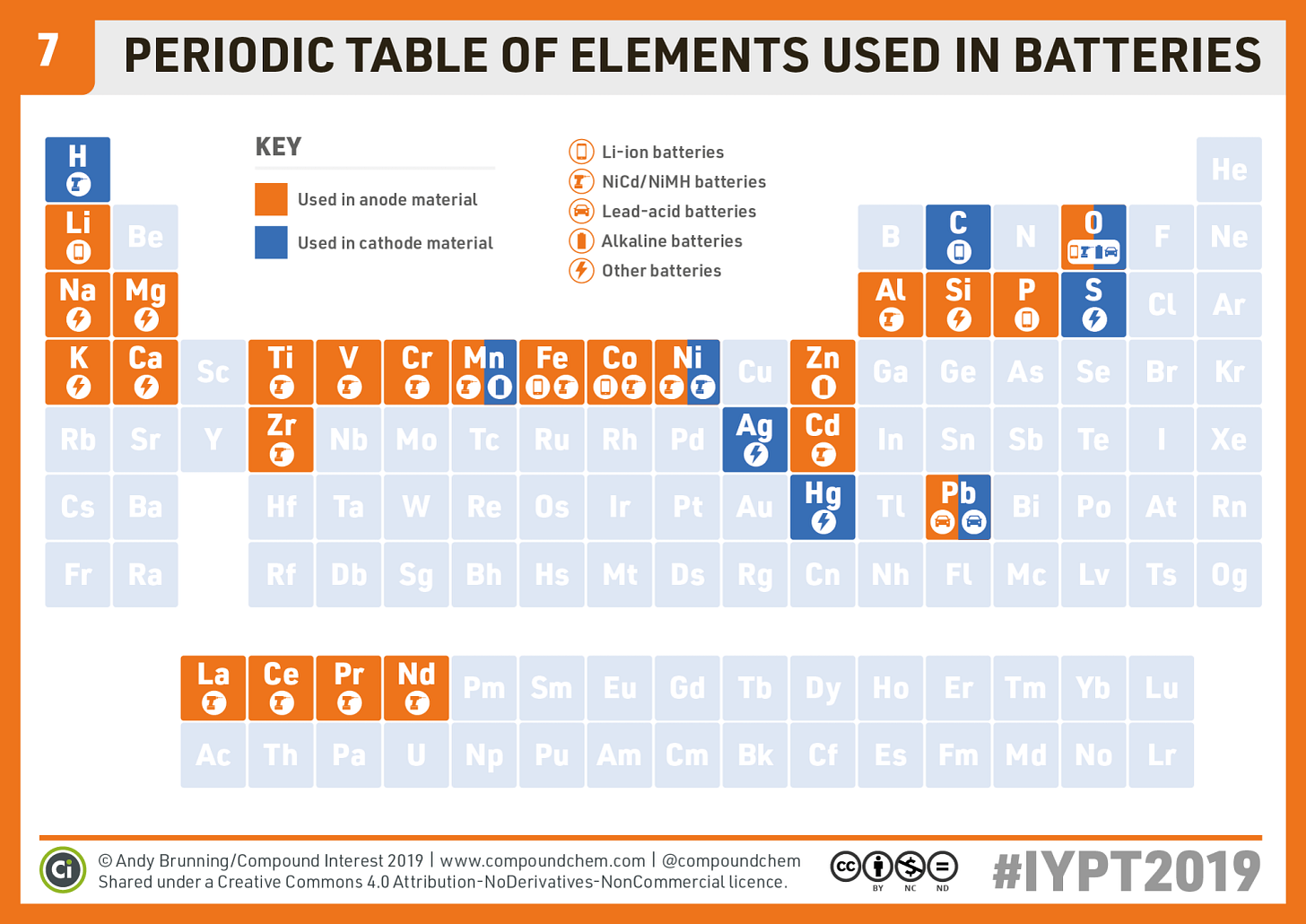We find ourselves right at the beginning of the clean energy revolution and I am fascinated by it. The economy and manufacturing and supply chains and energy production and consumption and much more will change in deep, fundamental ways. My brain hurts just thinking about the scale of it all.
Take batteries. This great piece of tech that powers our devices is central to our clean energy future. If you think batteries are already everywhere, just watch to see what will happen in the next few decades. Batteries will effectively power the world (a lot of it has to do with the intermittent nature of sun & wind power, but I'll park that topic for another day). Batteries will go from powering phones and laptops to powering cars, houses, and even entire cities.
Batteries are built from a few select minerals that are mined from very few places in the world, and what I don't hear enough people talk about is: where will the stuff for making all these batteries come from?
For very cool reasons that I don't know how to explain well because I've always sucked at chemistry, lithium is the only game in town for batteries that need to be both light and energy dense (ok, I’ll try: it is the lightest metal in the universe). There are other critical materials too: nickel, cobalt, aluminum, sodium, manganese, iron, and much more (chiefly copper which is critical but not so much for batteries themselves).
To give you a sense of how much more of those metals we need, just consider the that the battery in the new Hummer EV weighs more than a whole Honda Civic. That is 1.3 metric tons of battery material in just one car. If your mind is not blown yet, think about the billions of electric vehicles and stationary storage we will need, in addition to all the phones and laptops and TVs that we have to continue to manufacture as we decarbonize the global economy while it keeps growing.
Like or not, what is going to get us off fossil fuels is more extractive economy. How much more? For the main metals: copper, nickel, cobalt and lithium, extraction will need to increase by 5x or by mid century, and by orders of magnitude in some cases. That kind of scaling this fast has never happened in history.
My main takeaways from all this?
Farewell Big Oil, hello Big Mining: if we want a clean energy future, we will need lots of expensive mining projects to happen cheaply and at scale. You know who is really good at doing that sort of stuff? Big corporations. While the relevance of large oil and gas companies should and will diminish, people who rail about Evil Big Oil today could in the future be worrying about Big Mining (and Big Solar for that matter!)
Geopolitics will get shaky: many of the critical mineral deposits are located in very few corners of the world, some in politically unstable countries. That could be an opportunity to improve millions of lives in under-developed parts of the world, or it could be a recipe for conflict and political instability at a global level.
The economics are all but uncertain: the price of battery metals are spiking like crazy, 400% rise for lithium, and 80% for cobalt in 2021 alone (it has gotten worse since). For all the reasons above, there's no telling what will happen to the price of those commodities in the future. That is not exactly reassuring as much of the world is in the middle of re-inventing supply chains and scaling new technology like never before.
That last point feels to me like a massive risk with the energy transition. Things could get very expensive in the main supply-side bottleneck of addressing the climate crisis. And to move on with this transition as quickly as we need to, we have to make this stuff economically viable for companies, governments, and people.
Dig deeper:
Read: Green Upheaval: The New Geopolitics of Energy a well thought out Foreign Affairs article.
Listen: The big rush for battery metals is the podcast that sent me down the battery rabbit hole.
Watch: Mining for a climate solution. You might not care for the Australian angle, but it is relevant because climate change will be solved locally everywhere. Plus, it is worth watching just to hear them say “coppah”.
Related topics I want to learn more about:
Did you know that Cuba has one of the world’s largest cobalt reserves?
Mining is currently a very carbon intensive activity. Ain’t that a pickle!
The role of recycling. Extraction of battery metals will have to scale quickly, but only up to a point. To make all of this economically viable and environmentally sustainable in the very long run, we will need to get very good at battery recycling in the second half of the century.
How batteries actually work.



